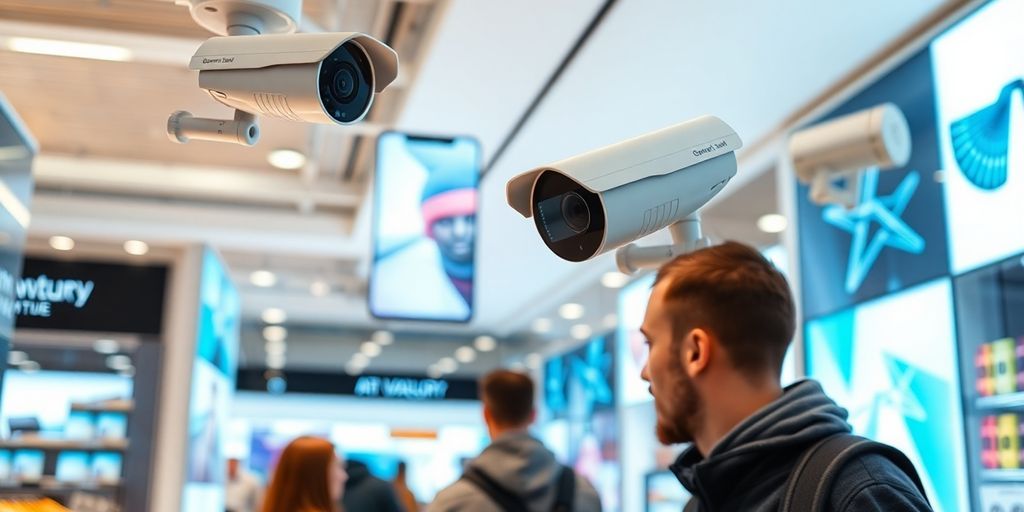In a significant advancement for the retail industry, artificial intelligence (AI) technology is being deployed to combat shoplifting and streamline administrative processes. This innovative approach is not only enhancing security but also improving operational efficiency for businesses worldwide.
Key Takeaways
- AI technology is effectively reducing shoplifting incidents by up to 60%.
- Retailers are increasingly adopting AI-powered surveillance systems for theft detection.
- Workflow automation tools are helping businesses cut down on administrative inefficiencies.
The Rise of AI in Retail Security
The retail sector has faced a surge in shoplifting incidents, prompting businesses to seek advanced solutions. AI-powered surveillance systems, such as those developed by companies like Veesion, are at the forefront of this battle. These systems utilize machine learning algorithms to analyze video footage from closed-circuit television (CCTV) and identify suspicious behaviors indicative of theft.
- Key Features of AI Surveillance Systems:
- Behavior Analysis: The technology learns from vast amounts of data to recognize patterns associated with shoplifting.
- Biometric Technology: It can detect unusual body movements, such as concealing items in clothing.
- Continuous Learning: The systems improve over time, adapting to new tactics employed by shoplifters.
Impact on Retail Operations
The implementation of AI technology is not limited to theft prevention. Retailers are also leveraging AI to enhance overall operational efficiency. For instance, SourceWhale, a company specializing in workflow automation, has developed tools that streamline recruitment processes for agencies.
- Benefits of Workflow Automation:
- Time Savings: Automates repetitive tasks, allowing staff to focus on more strategic activities.
- Cost Reduction: Reduces administrative overhead, leading to significant savings for businesses.
- Improved Client Engagement: Enhances communication and follow-up processes with candidates and clients.
Real-World Applications
Recent case studies highlight the effectiveness of AI in tackling organized retail crime. Law enforcement agencies have successfully utilized AI technology to dismantle shoplifting rings, showcasing its potential beyond mere surveillance.
- Case Study Highlights:
- Detective Success: New technologies have aided detectives in identifying and apprehending organized shoplifting crews.
- Collaboration with Retailers: Law enforcement and retailers are increasingly working together, sharing data and insights to combat theft more effectively.
The Future of AI in Retail
As the retail landscape continues to evolve, the integration of AI technology is expected to grow. With ongoing advancements in machine learning and data analytics, businesses can anticipate even more sophisticated tools to address theft and operational challenges.
- Future Trends:
- Enhanced Security Measures: Continued development of AI systems to stay ahead of evolving theft tactics.
- Broader Applications: Expansion of AI technology into other areas of retail, such as inventory management and customer service.
In conclusion, AI technology is proving to be a game-changer for the retail industry, offering innovative solutions to combat shoplifting and improve administrative efficiency. As businesses embrace these advancements, the potential for increased security and operational success is promising.
Sources
- Watch Brookfield: AI Most Transformational Technology Ever, Bloomberg.
- Technology being used to identify, report student protesters for possible deportation, MassLive.
- AI business technology takes on shoplifters and admin drag, Financial Times.
- New technology helps detectives bust organized shoplifting crew – NBC4 Washington, NBC4 Washington.

Peyman Khosravani is a seasoned expert in blockchain, digital transformation, and emerging technologies, with a strong focus on innovation in finance, business, and marketing. With a robust background in blockchain and decentralized finance (DeFi), Peyman has successfully guided global organizations in refining digital strategies and optimizing data-driven decision-making. His work emphasizes leveraging technology for societal impact, focusing on fairness, justice, and transparency. A passionate advocate for the transformative power of digital tools, Peyman’s expertise spans across helping startups and established businesses navigate digital landscapes, drive growth, and stay ahead of industry trends. His insights into analytics and communication empower companies to effectively connect with customers and harness data to fuel their success in an ever-evolving digital world.












